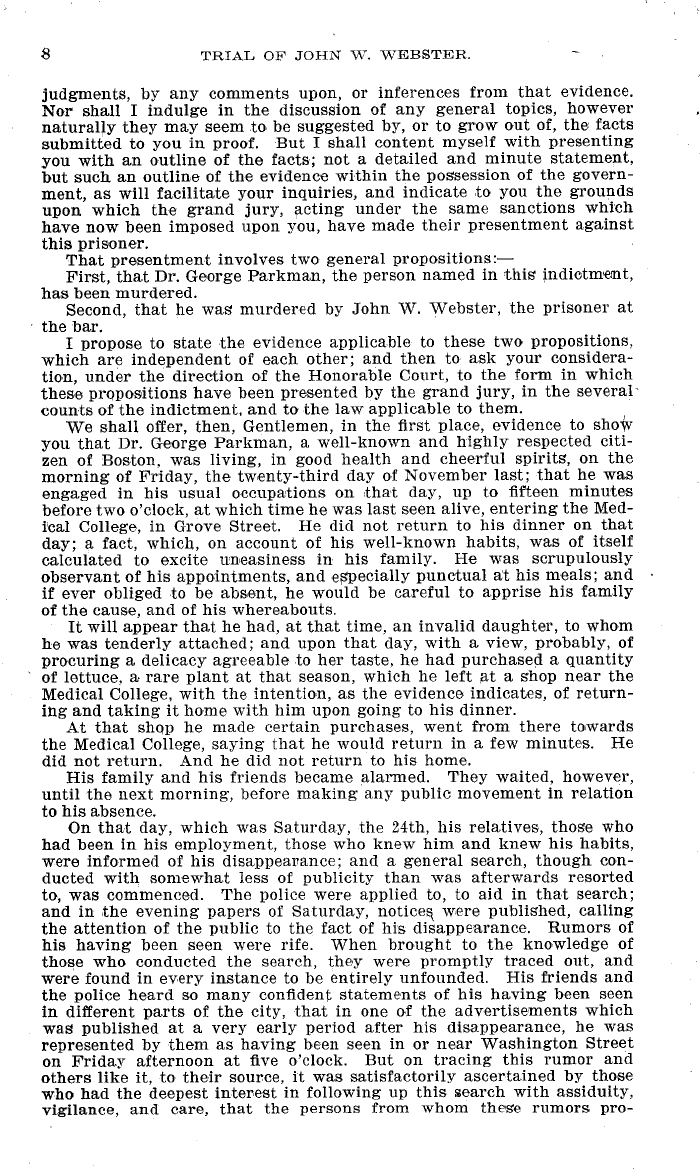|
H TRIAL OF JOHN W. WEBSTER.
judgments, by any comments upon, or inferences from that evidence.
Nor shall I indulge in the discussion of any general topics, however
naturally they may seem to be suggested by, or to grow out of, the facts
submitted to you in proof. But I shall content myself with presenting
you with an outline of the facts; not a detailed and minute statement,
but such an outline of the evidence within the possession of the govern-
ment, as will facilitate your inquiries, and indicate to you the grounds
upon which the grand jury, acting under the same sanctions which
have now been imposed upon you, have made their presentment against
this prisoner.
That presentment involves two general propositions:-
First, that Dr. George Parkman, the person named in this indictment,
has been murdered.
Second, that he was murdered by John W. Webster, the prisoner at
the bar.
I propose to state the evidence applicable to these two propositions,
which are independent of each other; and then to ask your considera-
tion, under the direction of the Honorable Court, to the form in which
these propositions have been presented by the grand jury, in the several
counts of the indictment, and to the law applicable to them.
We shall offer, then, Gentlemen, in the first place, evidence to show
you that Dr. George Parkman, a well-known and highly respected citi-
zen of Boston, was living, in good health and cheerful spirits, on the
morning of Friday, the twenty-third day of November last; that he was
engaged in his usual occupations on that day, up to fifteen minutes
before two o'clock, at which time he was last seen alive, entering the Med-
ical College, in Grove Street. He did not return to his dinner on that
day; a fact, which, on account of his well-known habits, was of itself
calculated to excite uneasiness in his family. He was scrupulously
observant of his appointments, and especially punctual at his meals; and
if ever obliged to be absent, he would be careful to apprise his family
of the cause, and of his whereabouts.
It will appear that he had, at that time, an invalid daughter, to whom
he was tenderly attached; and upon that day, with a view, probably, of
procuring a delicacy agreeable to her taste, he had purchased a quantity
of lettuce, a, rare plant at that season, which he left at a shop near the
Medical College, with the intention, as the evidence indicates, of return-
ing and taking it home with him upon going to his dinner.
At that shop he made certain purchases, went from there towards
the Medical College, saying that he would return in a few minutes. He
did not return. And he did not return to his home.
His family and his friends became alarmed. They waited, however,
until the next morning, before making any public movement in relation
to his absence.
On that day, which was Saturday, the 24th, his relatives, those who
had been in his employment, those who knew him and knew his habits,
were informed of his disappearance; and a general search, though con-
ducted with somewhat less of publicity than was afterwards resorted
to, was commenced. The police were applied to, to aid in that search;
and in the evening papers of Saturday, noticed were published, calling
the attention of the public to the fact of his disappearance. Rumors of
his having been seen were rife. When brought to the knowledge of
those who conducted the search, they were promptly traced out, and
were found in every instance to be entirely unfounded. His friends and
the police heard so many confident statements of his having been seen
in different parts of the city, that in one of the advertisements which
was published at a very early period after his disappearance, he was
represented by them as having been seen in or near Washington Street
on Friday afternoon at five o'clock. But on tracing this rumor and
others like it, to their source, it was satisfactorily ascertained by those
who had the deepest interest in following up this search with assiduity,
vigilance, and care, that the persons from whom these rumors pro-
|

